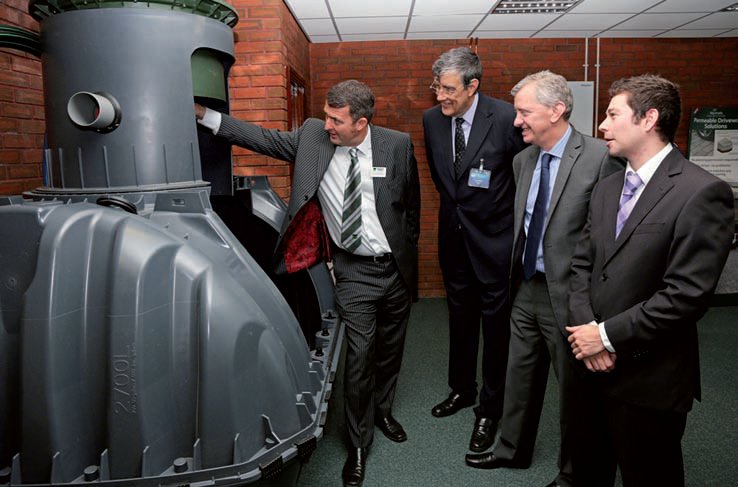Refocused and reinvented
8 February 2014The Builders Merchants Federation has reinvented itself over the last 18 months and membership is growing as a result. Sally Spencer reports
At a recent job appraisal, one Builders Merchants Federation (BMF) employee commented that the reason she liked working for the organisation was that "when we say we're going to do something, we do it".
Looking back at the changes and achievements made by the BMF over the past 18 months, you can see where she's coming from. And it's not just the office relocation and the largely newly-recruited team that stand out as different, it's the refocus on the members and a change in "cultural" attitudes that really signify the federation's reinvention.
"2013 was a time of tremendous change and is going to be remembered as a landmark year for the BMF," said managing director John Newcomb, who joined the federation in August 2012.
The single biggest physical change was the relocation from central London to central England - the move from Soho Square to Coventry in April last year.
As only two original employees relocated to Coventry with the BMF - marketing and communications manager Chris Harding and federation secretary Peter Matthews - a recruitment drive followed. This brought in a new team from a variety of backgrounds, from merchanting to engineering to membership management.
"If you include me, 70% of the staff have been with us for less than 18 months," said Mr Newcomb. "They've all integrated very well."
Of course, the relocation had wider significance. It immediately made the federation more centralised. "We're a national organisation and this put us in the heart of our membership," said Mr Newcomb.
As the BMF owned the Soho Square premises, it also made the federation financially stable and able to invest in additional membership services.
The federation's mission statement is "to be the authoritative voice of the merchant industry" and to be fully inclusive, representing the interests of what Mr Newcomb refers to as "the four foundation stones". These comprise the nationals, such as Saint-Gobain and the Grafton Group; large multiple branch independents, such as Howarth Timber, Ridgeons and MKM: small to medium-sized merchants (who make up around 50% of BMF membership); and suppliers to the builders merchants sector.
Membership numbers, having been on the decline for the last decade - dropping from 517 in 2003 to 324 in 2012 - are on a strong upward trajectory, currently standing at 425.
"The membership has a combined turnover of £12bn and employs more than 70,000 people, so we already represent a very substantial industry," said Mr Newcomb.
The membership split comprises 274 merchants with more than 2,000 branches and sales of £6bn between them. Within that group there is a wide spread of operations, from small merchants turning over £5m to Jewson with its £2bn turnover. Fifteen of the top 20 merchants are now members.
Suppliers have been perhaps the most neglected segment of membership in the past, said Mr Newcomb, but that has been redressed and these companies, which include SCA Timber Supply, along with SIG UK, Fakro, Bradstone, and Velux, for example, now number 113 and account for a third of membership.
"On the supplier side we go from lightside, such as Yale and Neff, to heavyside such as Aggregate Industries, so there are some pretty major names in there," said Mr Newcomb.
"And these are particularly useful names when we're lobbying government."
As part of its restructuring the BMF took the radical decision to reduce its merchants' membership fees by 25% and to simplify the structure by basing them on turnover bands, but while this undoubtedly had an impact, it's not seen as the main cause of the recovering membership figures.
"It's the resurgence of the BMF that has really brought them in," said Mr Newcomb. "For example, suppliers' fees stayed the same, but a number of new suppliers still joined us. And I know for a fact that some companies had left the BMF not for financial reasons but because they felt we weren't listening to them. That's changed."
Another change, and one that has had a dramatic effect on membership, is the attitude towards buying groups.
"When I joined they were seen almost as competitors, in some way replacing what the BMF used to do," said Mr Newcomb. "There was a feeling that we'd lost contact with our members because of them.
"But we now recognise they are central to this industry and have embraced them. Over the last 12 months we have brought four of the seven buying groups into the fold."
These four are IBC, which has 175 members; NBG, which has 81 members; PHG (plumbing and heating), which has 21 members; and the latest recruit, LIMA, which predominantly comprises Bradfords and MKM.
Membership deal
As part of its membership drive the BMF also struck a six-month deal with the Timber Trade Federation (TTF), an organisation for which Mr Newcomb has "a lot of respect". Under the reciprocal arrangement the BMF offers a 10% discount on its current annual membership to any member of the TTF that joins and vice versa.
The BMF has four core membership services. It provides an opportunity for networking, particularly between merchants and their suppliers, regular communication and business support, training and political representation.
The latter sees Mr Newcomb's regular attendance at Westminster for both receptions and one-to-one meetings. A recent meeting with Lord Newby, the chief government adviser on treasury, to discuss VAT issues is a prime example.
The BMF also attends each of the major political parties' annual conferences and is active with the Welsh Assembly and the Scottish Parliament.
With the Scottish independence vote this year, links with the country are seen as particularly important and the federation recently had its first meeting with SNP housing minister Margaret Burgess. On a more social level, it also reinstated its very popular Burns Night supper this year, which was a sell-out success - no fewer than 210 guests saw the haggis piped into Glasgow's Free Trade Hall, courtesy of the BMF.
Training is still very much at the heart of the BMF's activities and, for some members, is the chief motivation for joining.
"We are capable of running up to 60 courses a year covering everything from sales training, to leadership, transport, management development and so on," said Mr Newcomb.
"We've just revamped all our training material and have put together a new prospectus. We run our own diploma and our own foundation degree course so we say you can take a school leaver with no qualifications and put them through an apprenticeship scheme, then a diploma and they can come out at the age of 25 with a foundation degree. I don't know any other industries or trade associations that can offer that."
A new two-day event, the Branch Managers Forum, will take place on April 30-May 1 and include a full programme of seminars and product master classes. One of these master classes will be on timber and will be presented by SCA.
Over the last year huge effort has been put into ensuring the benefits of BMF membership are communicated strongly. The website and corporate literature have been revamped, new business guides and a newsletter produced and an advertising campaign launched "to get non-members to take another look at the BMF".
The biggest difference in communication channels is that the BMF is now "taken out to members" rather than expecting the opposite.
"We've done trade shows such as Timber Expo, Totally Tools, Greenbuild and PHEX and we have resurrected regional meetings for merchants and suppliers. Twenty of these take place a year."
Guest speakers at these meetings have included representatives from the FMB, the CBI and the Bank of England. The latter finds these meetings particularly useful, said Mr Newcomb, as it enables it to find out what is happening "on the ground", information which it feeds back to the Monetary Policy Committee.
The new Coventry headquarters also act as a hub for "direct access and interface" with and between merchant and supplier members, he added. In fact, the building has plenty of meeting space, including three large rooms that are available for member companies' own meetings. Yale, Fakro and Aggregate Industries, who benefit from having their branding on display here, sponsor these rooms.
Further networking opportunities are available at the annual all-industry conference organised alternately by the NMBS and the BMF. Traditionally held overseas over three days, last year's BMF-organised event changed format, was thrown open to non-members and was hailed as "the best ever" by delegates.
The annual UK Members' Day has also had a makeover and last year featured a new Young Merchant Achiever Award, organised in conjunction with SCA and BMJ.
Initiatives and developments are coming thick and fast this year, too.
A new trade credit guarantee scheme is up and running, for example. "The first five contracts have just gone out and people are starting to get credit through this facility. It's a pilot scheme, which was due to end in March, but has been extended until the end of September," said Mr Newcomb, adding that the BMF is the only trade association in the UK to be running a scheme of this nature.
Market information
The association is also working closely with market research agency GfK with the aim of getting a builders merchants' panel off the ground early this year. Eighteen builders merchants groups are currently supplying their sales out data into GfK's central statistical base, which in turn will provide an accurate view of how many individual products per week are being sold and by whom.
It's bringing retail/consumer-based technology into the merchanting world and will provide a very accurate view of how the market is performing and how it is structured.
Later this year the BMF will revamp its customer charter. "This is a promise to the builder that when he goes into a BMF member he can expect to see certain standards - he'll see the BMF logo as a sign of quality."
Other key initiatives include a youth recruitment campaign this spring, targeting 16 to 18-year-olds and focusing on careers advisers, job centres and local colleges.
Looking ahead, it's perfectly possible that some of those 16 to18-year-olds will eventually find themselves heading builders merchants and taking up BMF membership and there's no doubting that the federation will be ready for them.
In the meantime, John Newcomb is setting his sights on attracting one more national and one more buying group into the fold this year and on breaking through the 500 members mark.
"We currently have around 60% market share of merchants but if we achieve those goals we'll be looking at 75-80% market share," he said.


